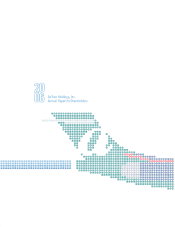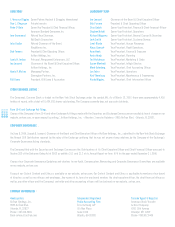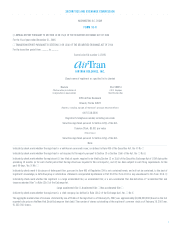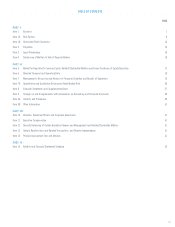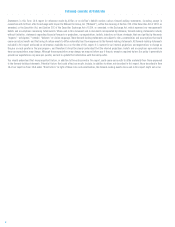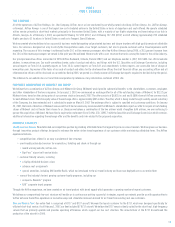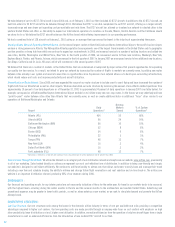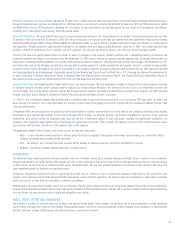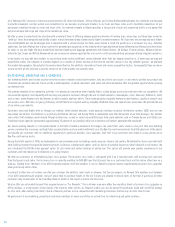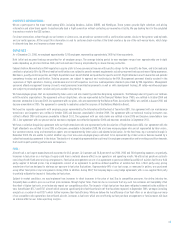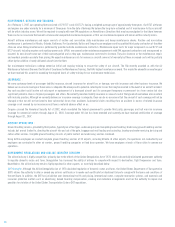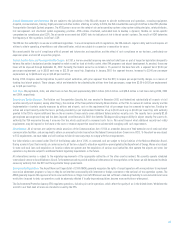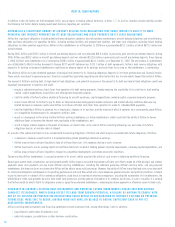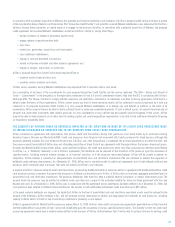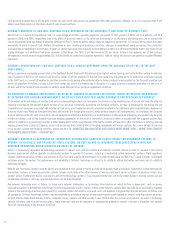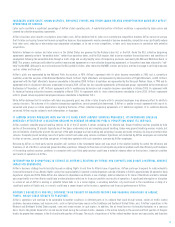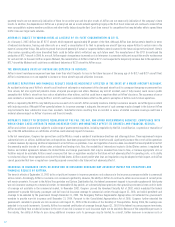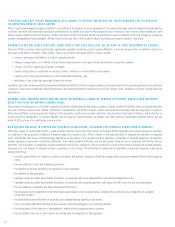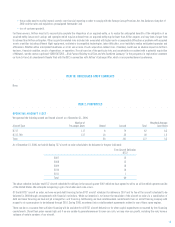Airtran 2006 Annual Report Download - page 11
Download and view the complete annual report
Please find page 11 of the 2006 Airtran annual report below. You can navigate through the pages in the report by either clicking on the pages listed below, or by using the keyword search tool below to find specific information within the annual report.
COMPUTER RESERVATIONS :
We are a participant in the major travel agency GDSs, including Amadeus, Galileo, SABRE, and WorldSpan. These systems provide flight schedules and pricing
information and allow travel agents to electronically book a flight reservation without contacting our reservations facility. We pay booking fees for the completed
transactions made in the GDS systems.
For direct reservations, either through our call centers or airtran.com, we provide our customers with a confirmation number, similar to the systems used by hotels
and car rental agencies. At the airport this information is used for customer check-in either at the ticket counter or by use of the self-service kiosks, which helps
to alleviate long lines and improve customer service.
EMPLOYEES :
As of December 31, 2006, we employed approximately 7,700 employees representing approximately 7,400 full-time equivalents.
Both initial and recurrent training are provided for all employee groups. The average training period for new employees ranges from approximately one to eight
weeks depending on job classification. Both pilot and mechanic training are provided by in-house training instructors.
Federal Aviation Administration (FAA) regulations require pilots to have commercial licenses with specific ratings for the aircraft to be flown, and to be medically
certified as physically fit to fly. FAA and medical certifications are subject to periodic renewal requirements including recurrent training and recent flying experience.
Mechanics, quality-control inspectors and flight dispatchers must be certificated and qualified for specific aircraft. Flight attendants must have initial and periodic
competency training and qualification. Training programs are subject to approval and monitoring by the FAA. Management personnel directly involved in the
supervision of flight operations, training, maintenance and aircraft inspection must also meet experience standards prescribed by FAA regulations. Management
personnel attend management training classes to meet government mandated requirements as well as skills development training. All safety-sensitive employees
are subject to pre-employment, random and post-accident drug testing.
We have employee groups that are represented by labor unions and are covered by collective bargaining agreements. The Railway Labor Act governs our relations
with these labor organizations. The agreement with our dispatchers, who are represented by the Transport Workers Union (TWU), was ratified in October 2004 and
becomes amendable in January 2009. Our agreement with our pilots, who are represented by the National Pilots Association (NPA), was ratified in August 2001 and
became amendable in 2005. The agreement is currently in mediation under the auspices of the National Mediation Board.
We have four separate agreements with employee groups represented by the International Brotherhood of Teamsters (IBT). Our agreement with our maintenance
technicians and inspectors was ratified in October 2005 and becomes amendable in October 2009. The agreement with our technical training instructors was
ratified in March 2006 and becomes amendable in March 2011. The agreement with our stock clerks was ratified in June 2006 and becomes amendable in June
2011. Our agreement with our ground service mechanic employees was effective September 2006 and becomes amendable in September 2011.
We have a collective bargaining agreement with our flight attendants who are represented by the Association of Flight Attendants (AFA). Our agreement with the
flight attendants was ratified in June 2005 and becomes amendable in December 2008. We also have many employees who are not represented by labor unions.
Our customer service, ramp and reservations agents are not represented by labor unions and rejected unionization, for the third time, by a substantial margin in
December 2005. We are unable to predict whether any of our non-union employee groups will elect to be represented by a labor union or become covered by a
collective bargaining agreement in the future. The election of a bargaining representative could result in employee compensation and/or working condition demands
that could impact operating performance and expenses.
FUEL :
Aircraft fuel is our largest expenditure and accounted for 36.5 percent, 32.4 percent and 24.8 percent of our 2006, 2005 and 2004 operating expenses, respectively.
Increases in fuel prices or a shortage of supply could have a material adverse effect on our operations and operating results. We utilize fuel purchase contracts
consisting of both fixed-price and cap arrangements. Fixed-price arrangements consist of an agreement to purchase defined quantities of aviation fuel from a third
party supplier at defined prices. Cap arrangements consist of an agreement to purchase defined quantities of aviation fuel from a third party using pricing
mechanisms that are designed to minimize our exposure to fuel price fluctuations. Approximately 44% of our fuel usage, as measured in gallons, was purchased
using either fixed price or cap arrangements during 2006. In addition, during 2007, the Company began using hedge agreements with a non-supplier third party
to partially mitigate the impact of fluctuating jet fuel prices.
Subject to market conditions, we may implement fare increases to offset increases in the price of fuel. Due to competitive pressures, the airline industry has
frequently been unable to pass on such fuel price increases through higher fares. There can be no assurance that any such fare increases will completely offset
the effect of higher fuel costs or not adversely impact our competitive position. The impacts of high fuel prices have been mitigated somewhat by the addition of
new, fuel-efficient B717 and B737 aircraft which consume significantly less fuel than the aircraft that have been replaced. In September 2005, we began installing
winglets on a number of our B737’s which further improves their fuel efficiency. While we believe the fuel efficiency of our fleet offers us an advantage over many
of our competitors who operate less fuel-efficient aircraft, increases in fuel costs which are not offset by our fuel purchase arrangements or fare increases will have
an adverse effect on our future operating margins.
05

